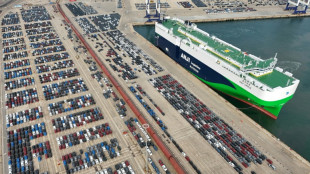-
 Thunder crush Grizzlies, Celtics and Cavs open NBA playoffs with wins
Thunder crush Grizzlies, Celtics and Cavs open NBA playoffs with wins
-
Beijing slams 'appeasement' of US in trade deals that hurt China

-
 Trump in his own words: 100 days of quotes
Trump in his own words: 100 days of quotes
-
Padres say slugger Arraez 'stable' after scary collision

-
 Trump tariffs stunt US toy imports as sellers play for time
Trump tariffs stunt US toy imports as sellers play for time
-
El Salvador offers to swap US deportees with Venezuela

-
 Higgo holds on for win after Dahmen's late collapse
Higgo holds on for win after Dahmen's late collapse
-
El Salvador's president proposes prisoner exchange with Venezuela

-
 Gilgeous-Alexander, Jokic, Antetokounmpo named NBA MVP finalists
Gilgeous-Alexander, Jokic, Antetokounmpo named NBA MVP finalists
-
Thomas ends long wait with playoff win over Novak

-
 Thunder rumble to record win over Grizzlies, Celtics top Magic in NBA playoff openers
Thunder rumble to record win over Grizzlies, Celtics top Magic in NBA playoff openers
-
Linesman hit by projectile as Saint-Etienne edge toward safety

-
 Mallia guides Toulouse to Top 14 win over Stade Francais
Mallia guides Toulouse to Top 14 win over Stade Francais
-
Israel cancels visas for French lawmakers

-
 Russia and Ukraine trade blame over Easter truce, as Trump predicts 'deal'
Russia and Ukraine trade blame over Easter truce, as Trump predicts 'deal'
-
Valverde stunner saves Real Madrid title hopes against Bilbao

-
 Ligue 1 derby interrupted after assistant referee hit by projectile
Ligue 1 derby interrupted after assistant referee hit by projectile
-
Leclerc bags Ferrari first podium of the year

-
 Afro-Brazilian carnival celebrates cultural kinship in Lagos
Afro-Brazilian carnival celebrates cultural kinship in Lagos
-
Ligue 1 derby halted after assistant referee hit by projectile

-
 Thunder rumble with record win over Memphis in playoff opener
Thunder rumble with record win over Memphis in playoff opener
-
Leverkusen held at Pauli to put Bayern on cusp of title

-
 Israel says Gaza medics' killing a 'mistake,' to dismiss commander
Israel says Gaza medics' killing a 'mistake,' to dismiss commander
-
Piastri power rules in Saudi as Max pays the penalty

-
 Leaders Inter level with Napoli after falling to late Orsolini stunner at Bologna
Leaders Inter level with Napoli after falling to late Orsolini stunner at Bologna
-
David rediscovers teeth as Chevalier loses some in nervy Lille win

-
 Piastri wins Saudi Arabian Grand Prix, Verstappen second
Piastri wins Saudi Arabian Grand Prix, Verstappen second
-
Kohli, Rohit star as Bengaluru and Mumbai win in IPL

-
 Guirassy helps Dortmund past Gladbach, putting top-four in sight
Guirassy helps Dortmund past Gladbach, putting top-four in sight
-
Alexander-Arnold lauds 'special' Liverpool moments

-
 Pina strikes twice as Barca rout Chelsea in Champions League semi
Pina strikes twice as Barca rout Chelsea in Champions League semi
-
Rohit, Suryakumar on song as Mumbai hammer Chennai in IPL

-
 Dortmund beat Gladbach to keep top-four hopes alive
Dortmund beat Gladbach to keep top-four hopes alive
-
Leicester relegated from the Premier League as Liverpool close in on title

-
 Alexander-Arnold fires Liverpool to brink of title, Leicester relegated
Alexander-Arnold fires Liverpool to brink of title, Leicester relegated
-
Maresca leaves celebrations to players after Chelsea sink Fulham

-
 Trump eyes gutting US diplomacy in Africa, cutting soft power: draft plan
Trump eyes gutting US diplomacy in Africa, cutting soft power: draft plan
-
Turkey bans elective C-sections at private medical centres

-
 Lebanon army says 3 troops killed in munitions blast in south
Lebanon army says 3 troops killed in munitions blast in south
-
N.America moviegoers embrace 'Sinners' on Easter weekend

-
 Man Utd 'lack a lot' admits Amorim after Wolves loss
Man Utd 'lack a lot' admits Amorim after Wolves loss
-
Arteta hopes Arsenal star Saka will be fit to face PSG

-
 Ukrainian troops celebrate Easter as blasts punctuate Putin's truce
Ukrainian troops celebrate Easter as blasts punctuate Putin's truce
-
Rune defeats Alcaraz to win Barcelona Open

-
 Outsider Skjelmose in Amstel Gold heist ahead of Pogacar and Evenepoel
Outsider Skjelmose in Amstel Gold heist ahead of Pogacar and Evenepoel
-
Arsenal make Liverpool wait for title party, Chelsea beat Fulham

-
 Trump slams 'weak' judges as deportation row intensifies
Trump slams 'weak' judges as deportation row intensifies
-
Arsenal stroll makes Liverpool wait for title as Ipswich face relegation

-
 Sabalenka to face Ostapenko in Stuttgart final
Sabalenka to face Ostapenko in Stuttgart final
-
Kohli, Padikkal guide Bengaluru to revenge win over Punjab

Is Australia’s Economy Doomed?
The Australian economy, long admired for its resilience and resource-driven growth, faces mounting concerns about its future trajectory. With global economic headwinds, domestic challenges, and structural vulnerabilities coming to the fore, analysts are questioning whether the nation’s prosperity is at risk. While some warn of a potential downturn, others argue that Australia’s adaptability and strengths could steer it clear of doom. A closer look reveals a complex picture of risks and opportunities shaping the country’s economic outlook.
Australia’s economy has historically thrived on its vast natural resources, particularly iron ore, coal, and natural gas, which have fueled exports to Asia, especially China. However, global demand for these commodities is softening. China’s economic slowdown, coupled with its pivot toward green energy, has reduced reliance on Australian coal and iron ore. In 2024, iron ore prices dropped significantly, impacting export revenues. This decline has exposed Australia’s heavy dependence on a single market, raising alarms about the need for diversification. Efforts to expand trade with India and Southeast Asia are underway, but these markets cannot yet offset the loss of Chinese demand.
Domestically, inflation remains a persistent challenge. In 2024, inflation hovered around 3.5%, down from its 2022 peak but still above the Reserve Bank of Australia’s (RBA) 2-3% target. High energy costs and supply chain disruptions have kept prices elevated, squeezing household budgets. Wage growth, while improving, has not kept pace with inflation, eroding real incomes. The RBA’s response—raising interest rates to 4.35%—has cooled the housing market but increased borrowing costs for households and businesses. Mortgage stress is rising, with many Australians grappling with higher repayments amid stagnant wages.
The housing crisis is another sore point. Skyrocketing property prices in cities like Sydney and Melbourne have locked out first-time buyers, fueling inequality. Construction costs have surged due to labor shortages and expensive materials, slowing new housing supply. Government initiatives to boost affordable housing have fallen short, leaving young Australians pessimistic about homeownership. This dynamic not only strains social cohesion but also hampers economic mobility, as wealth concentrates among older, property-owning generations.
Labor market dynamics add further complexity. Unemployment remains low at around 4.1%, a near-historic achievement. However, underemployment is creeping up, and many jobs are in low-wage, insecure sectors like retail and hospitality. Skilled worker shortages in critical industries—healthcare, engineering, and technology—persist, hampering productivity. Immigration, a traditional solution, has resumed post-pandemic, but visa processing delays and global competition for talent limit its impact. Without addressing these gaps, Australia risks stalling its economic engine.
Climate change poses a long-term threat. Extreme weather events—floods, bushfires, and droughts—have become more frequent, disrupting agriculture and infrastructure. The agricultural sector, a key economic pillar, faces declining yields due to unpredictable weather. Transitioning to renewable energy is essential, but progress is uneven. While Australia leads in solar adoption, its reliance on coal for domestic power generation undermines green ambitions. The cost of transitioning to net-zero emissions by 2050 is estimated at hundreds of billions, straining public finances already stretched by aging population costs.
Public debt, while manageable at around 40% of GDP, is another concern. Pandemic-era stimulus and infrastructure spending have driven deficits, with net debt projected to reach $1 trillion by 2027. Tax revenues from mining have cushioned the blow, but their decline could force tough choices—higher taxes or spending cuts—both politically contentious. The government’s focus on renewable energy and defense spending, including the AUKUS nuclear submarine deal, adds pressure to an already tight budget.
Yet, Australia is not without strengths. Its services sector, particularly education and tourism, is rebounding post-COVID, with international students and visitors returning in droves. The tech sector, though small, is growing, with startups in fintech and biotech attracting global investment. Critical minerals like lithium and rare earths offer new export opportunities as the world electrifies. Trade agreements with the UK, EU, and Indo-Pacific nations could open new markets, reducing reliance on China. Moreover, Australia’s stable institutions and skilled workforce provide a foundation for long-term growth.
Still, structural issues loom large. Productivity growth has stagnated, lagging behind global peers. An overreliance on housing and mining for wealth creation has crowded out investment in manufacturing and innovation. The education system, once a global leader, struggles to produce graduates aligned with future needs, particularly in STEM fields. Indigenous economic exclusion remains a persistent drag, with gaps in employment and income barely narrowing.
The question of whether Australia’s economy is doomed hinges on its ability to adapt. Pessimists point to declining commodity prices, rising debt, and climate risks as harbingers of decline. Optimists highlight the nation’s track record of dodging recessions—avoiding one for over three decades until COVID—and its capacity for reform. Policy choices in the coming years will be critical. Boosting productivity, diversifying exports, and investing in skills and renewables could secure prosperity. Failure to act, however, risks a slow slide into stagnation.
For now, Australia stands at a crossroads. Doomed? Not yet. But the warning signs are clear, and complacency is not an option.

EU: Von der Leyen withdraws controversial pesticide law

EU: Prison for "paedophilia manuals" and child abuse forgeries

EU: 90% cut of all greenhouse gas emissions by 2040?

How is climate change spreading disease?

Business: Is it important to speak multiple languages?

Trump's return could leave Europe 'on its own'

NASA and Lockheed partner present X-59 Quesst

China: Gigantic LED in a shopping centre

Did you know everything about panda bears?

Ukraine has a future as a glorious heroic state!

To learn: Chinese school bought an Airbus A320




